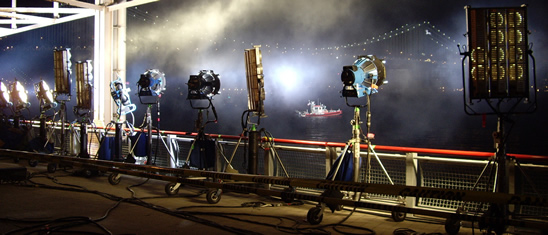Natural Light: Lighting “For Today”…
Everyone seems to have their own take on lighting, most studios/gaffers generally like to light the crap out of everything, while there’s nothing wrong with that (there are some times in larger productions when many lights are needed), most of the time (unless they’re going for some psychedelic party, sci-fi look, or artsy scene) all they are trying to do is “amplify” or “duplicate” what would be “natural light” in the scene itself (or fake it to “look natural” on their subject where there is no natural light – it’s all about “controlling” light)… they do this by using truck-loads of high-powered fixtures (traditionally what you’d recognize or have seen in behind-the-scenes of films as “movie lights”) and they have full departments on sets known as the “G&E” or “Grip and Electric” departments (crews of dozens of people) dedicated just to this.

-Picture from the set of Warner Bros' 2007 release "I Am Legend" lighting a scene near the Brooklyn Bridge in NYC-
While there’s nothing wrong with that (it’s worked for decades), my view is much simpler (especially with indie productions) why use dozens of lights, generators, crew, etc to “amplify” natural light when you can just shoot USING natural light? My view is very simple indeed: only add lights when you absolutely need them. Now—to be fair here, often the camera you shoot with dictates the amount of light needed in a shot for it to look right… until recently, most everything was still shot on 35mm film, which requires ridiculous amounts of light for things to read correctly on camera, but since new digital cinema cameras began to take over (especially in television) this is slowly changing, but still most “studio” shoots (digital or not) still bring in truckloads of lighting and grip equipment. I had the pleasure of working on an episode of HBO’s “True Blood” last year, that particular day we were shooting on location, and what stood out for me most was the sheer number of G&E trucks they had on location. Shooting in broad daylight, they still added nearly a dozen lights… now again, there’s no denying that in general, that show looks great, so it does seem to work for them, but it also begs the question, how much of that was really needed?
That said, personally, I absolutely love the look and feel of actual natural light especially for dramatic films; I use it as much as possible, whenever possible, and that was the entire concept in “For Today”. There was nothing fancy needed light wise, it’s a simple real-life drama and I wanted it to be as “natural” as possible. That said, one thing you should keep in mind is that this entire film was shot with only 3 lights. I intentionally selected a digital cinema camera & lens system (not one of the cheapo ‘prosumer’ cameras with built-in lens) that responds insanely well to low-light (and yes, the camera you choose to shoot on is extremely important!). Then the biggest trick is in the planning– specifically select locations that have a lot of natural light already. Then, picking and shooting at exactly the right times of day to get the best light coming in the right direction for each specific shot, often using large reflectors (‘bounce boards’) to reflect light where needed for the day-shoots (although since we were shooting in the winter with snow on the ground, we often didn’t even need the reflectors as the snow did most of the reflecting for us). Similarly, selecting interior locations with big-windows (corner rooms with windows on more than one wall are best), and exteriors for after dark, picking a location with specific natural light so that all we needed to do was add ONE light here or there to get exactly what we needed light/color temperature wise. The results are fantastic, here are some more stills from the film to show you what I mean:

-Still of Rebecca Richart from "For Today" - there was only one light used here, a single diffused light placed about six feet from her face mimicking a nearby street/flood light-

-Still of Charity Farrell from "For Today" - no lights were used here, just one bounce board reflecting light onto her face-